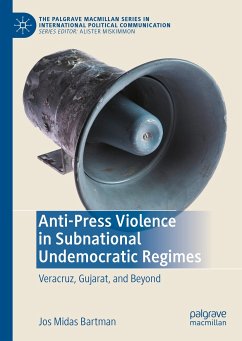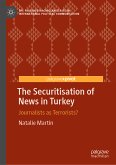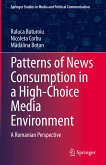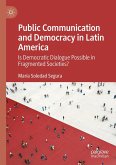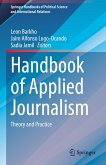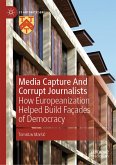Bartman uses subnational case studies and ethnographic techniques to answer the question of why journalists in subnational regimes are targeted for political violence. He builds on the boundary work of Gibson to argue that journalists who expose misdeeds outside of national capitals increase uncertainty for subnational leaders because they may activate corrective actors - the subnational electorate, the national public sphere, or directly central government political figures - who can bring local authoritarians to account. His work goes farther than any other I have seen to explain why so many journalists outside of war zones have been killed in democracies and democratic-authoritarian hybrids since the mid 1990s. It helps us understand and appreciate even more the vital roles journalists play in preserving democracy from the ground up, or at least, slowing democratic backsliding. -Sallie Hughes, Professor and Associate Dean, University of Miami, Miami, Florida.
The global trend of increasing violence against the press has spurred research interest into the questions of where, why, and how communicators are repressed. As a result, scholarship has demonstrating that hybrid regimes - which mix undemocratic and democratic elements - constitute a specifically dangerous and lethal context for these actors. Decentralized countries, in which some subnational political elites have retained authoritarian features, have been identified as the most perilous context for communicators. However, despite the burgeoning interest in illiberal practices and repression on the subnational level, it is still relatively unexplored how and why subnational political elites repress communicators within their multi-level setting. The author argues that communicators in subnational undemocratic regimes who can spread the scope of compromising information beyond subnational boundaries can cause uncertainties for subnational undemocratic regimes. The book explores how the political elites of these regimes repress these communicators in response.
Jos Bartman is a political scientist specializing in subnational politics, comparative politics and authoritarianism. He received his PhD from the University of Amsterdam, The Netherlands. He currently works as a research coordinator at Free Press Unlimited, where he investigates and coordinates the investigation into cold murder cases of journalist-killings. By investigating these cases, and by initiating in litigation as a result, he hopes to contribute to the ending of the pervasive impunity that coincides with attacks on the press.
Jos Bartman is a political scientist specializing in subnational politics, comparative politics and authoritarianism. He received his PhD from the University of Amsterdam, The Netherlands. He currently works as a research coordinator at Free Press Unlimited, where he investigates and coordinates the investigation into cold murder cases of journalist-killings. By investigating these cases, and by initiating in litigation as a result, he hopes to contribute to the ending of the pervasive impunity that coincides with attacks on the press.
Dieser Download kann aus rechtlichen Gründen nur mit Rechnungsadresse in A, B, BG, CY, CZ, D, DK, EW, E, FIN, F, GR, HR, H, IRL, I, LT, L, LR, M, NL, PL, P, R, S, SLO, SK ausgeliefert werden.
Es gelten unsere Allgemeinen Geschäftsbedingungen: www.buecher.de/agb
Impressum
www.buecher.de ist ein Internetauftritt der buecher.de internetstores GmbH
Geschäftsführung: Monica Sawhney | Roland Kölbl | Günter Hilger
Sitz der Gesellschaft: Batheyer Straße 115 - 117, 58099 Hagen
Postanschrift: Bürgermeister-Wegele-Str. 12, 86167 Augsburg
Amtsgericht Hagen HRB 13257
Steuernummer: 321/5800/1497
USt-IdNr: DE450055826
Bitte wählen Sie Ihr Anliegen aus.
Rechnungen
Retourenschein anfordern
Bestellstatus
Storno

